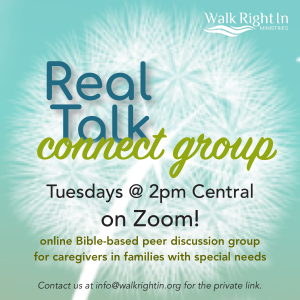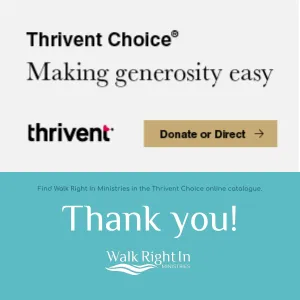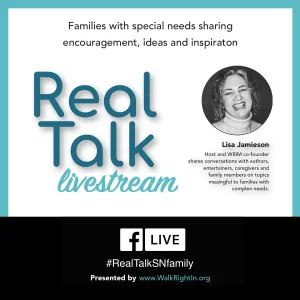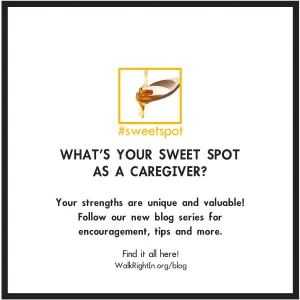
I’ve been thinking a lot lately about how important open communication is for growing children, especially those who grow up as siblings of someone with disabilities, chronic health conditions or other special needs. The stress, chronic grief and complex logistics of their lives warrant heightened intentionality about keeping lines of communication wide open. Our kids need more than adequate opportunity to process their complicated lives with all the associated emotions, pressures, challenges and even the intense joys.
My husband, Larry, and I tried to provide this kind of safe zone for our kids when they were growing up at home. We also encouraged their relationships with mentors at church and with our adult friends. We deeply appreciated that grandparents, aunts and uncles served in this way too. And we sought out counselling for them when it seemed appropriate (at school and with Christian professionals). As they have come into adulthood, our children are now passionate about helping other special-needs siblings to communicate and connect in relationships that keep them thriving too.
“Our kids need more than adequate opportunity to process their complicated lives with all the associated emotions, pressures, challenges and even the intense joys.”
No matter how old our children are—very young, teenaged or adult—I think parents owe it to their children to be among their safest places to land. Don’t we all want our kids to be emotionally and spiritually healthy and confident? I expect they’ll be most socially satisfied when they can be transparent in relationships. And they’ll be most emotionally grounded when those relationships are based on biblical values. So, when they need to ask questions or just process their thoughts and feelings, I want to be the kind of parent who is available, compassionate and wise. I want to listen with genuine curiosity and very little judgement. Especially when our kids were young, I also wanted to recognize when it was necessary to initiate certain conversations knowing that my children wouldn’t always recognize when they needed to talk something out. As one of our daughters was growing up, Larry was particularly good (much better than me) at drawing out her deeper or unrecognized (but necessary) feelings.
To this day, Larry and I tend to be conversation starters who seek to know what’s going on in our children’s hearts and minds. I want to be a better listener though. I tend to ask questions well but interject my own perspectives too often. Time and time again, I keep learning from what my children have to say.
Over the years, I have had countless conversations with my children about what it is like for them growing up in a family with special needs. Sometimes these conversations were welcomed and sometimes they were met with an eyeroll. “There goes mom again,” they seemed to say. “I don’t feel like talking about this subject right now,” was the message I got loud and clear. I had to get creative and as casual as possible about how I slipped questions into our conversations in the car or around the dinner table, for example. Yes, these are often hard conversations that nobody really wants to have. And so, we tend to avoid or under value the benefits. Still, I try to respect their space and give them a pass when I sense the eyeroll while conveying a simple reminder that my door is always open if they want to talk. Really, don’t all kids need that, even if they aren’t part of a special needs family? They need our accessibility and our respect. Now that my own children are adults, they admit that it was good for me to urge their openness now and then.
“No matter how old our children are
—very young, teenaged or adult—
I think parents owe it to their children to be among their safest places to land.”
Here’s another thing I noticed as our children were growing up. They ebbed and flowed through different stages of need for information and understanding about our situation as a family with special needs. Just like when they were learning about sex, I responded to their questions with increasing details as they grew in maturity. Similarly, I watched their questions, feelings and perspectives about being part of a special needs family change through different seasons of life. Now that they are meeting more and more peers who are also special-needs siblings, they are discovering how valuable it has been for them to have safe places to ask questions, express frustrations and disappointments, share ideas and have their perspectives valued. They see that not all special-needs siblings have adequate opportunities for that kind of processing.
A couple of years ago when my daughters and I started speaking around the country about parenting special siblings, I created a list of “Conversation Starters for Parents.” And along with that, there was a “Guide for Parents’ Reflection.” Click here to download these resources.
It can be a challenge knowing how to check in with our kids often enough but not so frequently that we irritate them. I have to remind myself sometimes that I’m asking primarily for their benefit, not my own. I also have to be careful about how frequently or intensely I share about my own grief with them. To some extent, I need to model healthy grief processing and stress management. I want them to see that I understand and resonate with them. But I know they need to understand my experience without mine superseding theirs.
“MY KIDS NEED TO UNDERSTAND MY EXPERIENCE WITHOUT MINE SUPERSEDING THEIRS.”
I’m thankful that none of us is ever too old to begin processing questions, feelings and perspectives along with our children. I’m coming to see this as one of the most precious rewards of having adult children. By raising them in an atmosphere of safe communication, we now enjoy treasured friendships with each of them.
To read more about great communication with special-needs siblings, check out this article from Church4EveryChild.com.
Click here for my full series of articles about ministering to people who are siblings of someone with special needs.
There are some common questions siblings may be asking themselves or others through the different life seasons.
Click here to download the “Sibling Season Questions” file.
This post by Lisa Jamieson first appeared June 2018 at LisaJamieson.org.










0 Comments
Trackbacks/Pingbacks